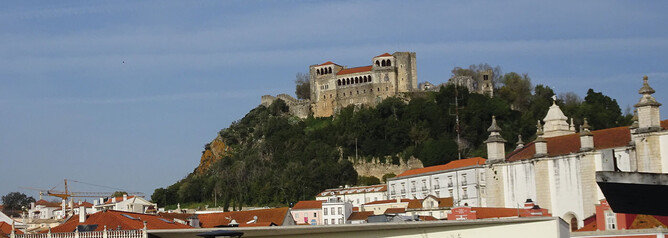Leiria Castle has been overlooking Leiria since 1142 when Dom Afonso Henrique built it to define a line of defence against Arab invaders. This began the major push that expelled the Moors after 400 years of unwelcome presence. Henrique became the first king of Portugal and Leiria Castle became an important part of Portuguese history and culture.
With the march of time, both the castle and the culture have seen much change, and the castle’s role today is mainly that of a tourist attraction and ever-present reminder of the inevitability of change.
A short distance from the castle are the remnants of Portugal’s first paper mill, which was established in 1411 in response to the growing hunger for communication, learning and positive change.
I am reminded of our 1994 arrival in Brazil and the purchase of a fax machine in order to overcome the ten days it took for ‘snail mail’ to travel between Brazil and Australia. I also remember prior discussions with a friend about a new development called ‘the Internet’. I even wondered if such a thing might one day have a role in our lives — ha!
Since then so much has changed in ministry means and methods. Our post-modern era is dominated by advances in information technology. The Internet, email, digital photography, data projectors, notebook computers, social media, video-conferencing, the smartphone, and other such developments have revolutionized our lives and ministry in so many ways.
Distances have taken on different meanings now as we video-conference a group discussion on evangelism with a dozen people from all over Spain and Portugal; or we have a School of the Prophets Bible study between Portugal at 1 am Monday and Brazil at 9 pm Sunday. Or we talk face-to-face with family in Australia, and we especially enjoy a dinnertime video meeting with our granddaughter Abigail in Australia while we have breakfast in Portugal. Such things were entirely unthinkable when we set out for the field 25 years ago. Now they are readily available and to neglect their use would be very limiting.
Our initial call to missionary service was to be willing to ‘stand in the gap’ (Ez 22:30) which led to us to Brazil to help another missionary couple support a network of a half-dozen small assemblies in Curitiba, a large city of two million people in southern Brazil. We were mostly involved in church-based ministry. Our week was full, and our focus was on teaching and training, “to equip the saints for the work of ministry, for building up the body of Christ” (Eph 4:12). We were also frequently in people’s homes for evangelistic Bible studies and discipleship studies, and in general we had the privilege of seeing a lot of progress in the gospel.
We are now in Portugal working with Brazilian workers Cláudio and Daisy Martinowski, who came to Portugal ten years ago also from Curitiba. They worked here in the north for eight years in evangelism in both rural and city work, and saw fruit from their labours. During this time, they asked us to pray about joining them. Over time they became burdened for the mostly unattended centre region of Portugal, and after much prayer and deliberation we are now together in that centre region halfway between the two main cities of Lisbon in the south and Porto in the north. Unlike Porto and Lisbon, this centre region has had little gospel work to date and there are no assemblies as yet.
Cláudio and Daisy live 15 minutes from us in the small city of Marinha Grande which has a population of 30,000. We live in the city of Leiria which has a population of 127,000. This has been a major transition for us because in Brazil we lived most of our time in the bush outside of the city limits. We slowly built a roomy house in which to raise our family and receive many people for youth, church and gospel events, as well as provide ongoing hospitality. It was somewhat rustic living, but we fully owned it and so rent was never an issue.
In contrast we now rent a small fifth-floor apartment in downtown Leiria. We have gone from ‘roomy rural’ to ‘small central urban’. When praying about the possibility of coming to Portugal we knew that apartment living would be necessary and wondered how we (Gavin!) would adjust to being away from the bush. As it turns out we live right beside a walking path that follows the Lis River, and to add to that there is a row of very high Plane trees right outside our windows. So, I still have much contact with trees, nature and greenery, but I no longer have to mow, rake or prune, which were all a part of our normal life in Brazil. We have replaced the weekly five hours of compulsory yard work in Brazil with hour-long prayer walks using the exercise path right outside our door, thus keeping fit as well as saturating the work in prayer. Thank you, Lord.
Living outside city limits in Brazil meant that we drove everywhere. In such a large city it was common to do over 600 km weekly in ministry. Now we live downtown and walk almost everywhere, and our 20-year-old car is only used several times a week. Janet especially appreciates being able to ‘pop out to pick up a few things’ with a good market only ten minutes’ walk away. However, she does need to remember that she has to carry it home by herself!
As well as changes in the way we live there have also been significant changes in the way we minister.
Brazil was discovered by Portugal in 1500 and colonized by them until becoming independent in the late 1800s, so there are a great many similarities between the two cultures. However, there are also many differences and we are still discovering many of them. The very language itself is quite different to Brazilian Portuguese, forcing us to go back and relearn some key areas and make significant adjustments to many others. We take comfort in the fact that Cláudio and Daisy also had the same difficulties even though they are native Portuguese speakers. What softens it for us is the fact that English is much more common in Portugal than it has ever been in Brazil. This makes communication easier. But more importantly, it has opened a wide door of opportunity for us in the work of the gospel.
Portugal is a country with a very accepting attitude toward legal immigration, and we became aware of an organization called SPEAK that exists to help immigrants with cultural assimilation. SPEAK does this by providing very low cost 12-week courses to give exposure to the language and culture. It is an exchange program so the students get to share their own language and culture at the same time. Janet and I have done both the Beginner’s and the Conversational Portuguese courses and found them helpful. More importantly this also put us in contact with other students for the very purpose of talking, and we have made friends from the community in this way.
This is important as we have discovered that, while the Portuguese are quite accepting of foreigners into their country, they are quite aloof about accepting people into their own homes and lives. In Brazil the culture is warm, open and friendly, and it is quite common to be invited into someone’s home. However, in Portugal a person’s home is a very private place and their personal space is very important. We have lived in our apartment block for almost two years and still don’t know anybody above a superficial level of polite and limited conversation. Compared with our 23 years in Brazil this has taken quite an amount of adjustment for us.
So it was a godsend to find the SPEAK courses where we have a legitimate reason for being in a group of people for 12 weeks with the stated purpose of talking to each other. SPEAK also offers courses in other language and culture groups and they asked if we would like to volunteer to teach a class in basic English, which we did, and we loved it so much we taught a second one. Then we taught Conversational English and are currently on our second Conversational English course with 18 students enrolled. SPEAK also offers their volunteer teachers free courses as students, so we have made use of them in both Portuguese and German. Cláudio and Daisy have also been students in the German course and currently Cláudio is in the Italian course. We are getting a lot of contact with people from the community that we would otherwise probably never meet, and we are now having significant contact with some of them at other times in the week. We are now well-known in the SPEAK community and participate frequently with them in other SPEAK-organised activities.
When our second SPEAK Basic English class finished, we offered the students free English lessons in our own rented shop space, Espaço Graça (Grace Space). It’s most readily accepted and we have now been together since April 2018. We offer a 90-minute class and draw heavily on our TAFE training in ESL. Each 15 minutes we focus on different areas of language learning and are currently memorising Psalm 23 as a pronunciation exercise. For the last 30 minutes we use Mark’s Gospel for text analysis and identify the different parts of speech, while constantly reading and rereading the passage. This is beginning to lead to spontaneous questions about the gospel itself. Yes!
Our English class starts at 7pm and finishes at 8:30 pm, and Cláudio then teaches a chronological Bible class starting at 8:45 pm. Cláudio is giving a panoramic overview of the Bible and God’s plan of salvation. Five of our English students then stay on for an hour of Bible teaching. We pray that they bring their friends.
Also, our English students have been telling their friends about our English class and there is a growing desire to join us. However, our shop space is mostly full, and we consider the ideal number of students to be ten or less. Because of this we plan to be starting another class next week.
Even though we have long been convinced that the chronological approach is a very sound and thorough approach to evangelistic teaching, we recognise that it does require a trained teacher and significant time commitment on the part of the student. As our number grows, we want to move towards more easily reproducible methods that anyone can do, and so we are now training all our believers in running simple Bible discovery groups where the study is more inductive rather than teacher-oriented. The passages selected are still presented in the same chronological and panoramic way, but the students find the information themselves rather than have it presented to them.
Janet is currently having such a study with two unsaved women from her Portuguese class, and each time they meet they seek to answer two basic questions after reading the passage several times. The questions are “What does this passage teach us about God?” and “What does it teach about man?”. They then look to see if there is something from the text that should be applied at home. A fellow missionary friend in Spain tells us that Janet’s group and our Sunday group are two of over 20 such discovery groups on the Iberian Peninsula right now, and we are praying that this number will grow to 50 before the end of 2019. Please pray with us about this.
We are keenly aware of the inevitability of change in all areas around us and actively seek to accompany such change wherever we can for more effective ministry. In the face of all the changes in life and ministry we hold on to the fact that God does not change, that the gospel remains the same and that our mission continues.
This coming August we will celebrate 25 years serving overseas as cross-cultural missionaries. Much has changed and much has stayed the same. Above all we see the Lord’s constancy in every area. He changes not.
by Gavin Petersen


